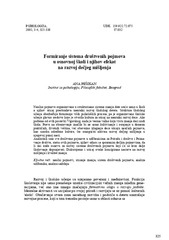Formiranje sistema društvenih pojmova u osnovnoj školi i njihov efekat na razvoj dečjeg mišljenja
Setting up a system of social concepts in elementary school and their influence of development of cognition in children
| dc.creator | Pešikan, Ana | |
| dc.date.accessioned | 2021-10-12T10:25:11Z | |
| dc.date.available | 2021-10-12T10:25:11Z | |
| dc.date.issued | 2001 | |
| dc.identifier.issn | 0048-5705 | |
| dc.identifier.uri | http://reff.f.bg.ac.rs/handle/123456789/363 | |
| dc.description.abstract | Naučne pojmove organizovane u strukturisane sisteme znanja dete sreće samo u školi a njihov uticaj preobražava mentalni razvoj školskog deteta. Struktura školskog učenja obezbeđuje formiranje viših psiholoških procesa, pa je organizovano školsko učenje glavno sredstvo koje je stvorila kultura za uticaj na mentalni razvoj dece. Ako pođemo od ovih postavki Vigotskog, onda je veoma važno koju vrstu znanja deci nudi škola. Pravo na obrazovanje značilo bi ne samo kultivisanje i ostajanje u domenu praktičnih, životnih veština, već obavezno izlaganje dece uticaju naučnih pojmova, kao uzorku određene kulture, što omogućiti aktivan razvoj dečjeg mišljenja u njegovoj punoj meri. Analizirali smo sve društvene pojmove u udžbenicima za Prirodu i društvo i Poznavanje društva, status ovih pojmova, njihov odnos sa spontanim dečjim pojmovima, da li oni nude osnovu za razvoj sistema društvenih pojmova koji će se kroz dalje školovanje dopunjavati. Diskutujemo i uticaj ovako koncipirane nastave na razvoj mišljenja i kvalitet znanja. | sr |
| dc.description.abstract | A child encounters scientific terms organized in structures systems of knowledge only at school, and their influence transforms mental development of schoolchildren. The structure of school learning provides for formation of higher psychological processes, so that organized school learning is the main tool designed by culture to influence mental development of children. If we take this Vigotsky's premise as the starting point, it is very important to know what kind of knowledge the school offers to children. The right to education implies not only cultivation and staying in the domain of practical life skills, but also mandatory exposure of children to the influence of scientific terms, as a sample of certain culture, which will enable active development of cognition of children to the full extent. We have analyzed all social terms and concepts in the textbooks for Nature & Society and Social Studies, the status of these terms/concepts, their relation with spontaneous children's terms, whether they provide the basis for the development of a system of social terms that will be expanded and complemented in the course of schooling. The influence of teaching designed in his manner on the development of thinking and knowledge is discussed. | en |
| dc.publisher | Društvo psihologa Srbije, Beograd | |
| dc.rights | openAccess | |
| dc.rights.uri | https://creativecommons.org/licenses/by-sa/4.0/ | |
| dc.source | Psihologija | |
| dc.subject | sticanje znanja | sr |
| dc.subject | sistem društvenih pojmova | sr |
| dc.subject | naučni pojmovi | sr |
| dc.subject | analiza udžbenika | sr |
| dc.subject | analiza sadržaja | sr |
| dc.subject | textbook analysis | en |
| dc.subject | system of social terms | en |
| dc.subject | syllabus analysis | en |
| dc.subject | scientific terms | en |
| dc.subject | knowledge acquisition | en |
| dc.title | Formiranje sistema društvenih pojmova u osnovnoj školi i njihov efekat na razvoj dečjeg mišljenja | sr |
| dc.title | Setting up a system of social concepts in elementary school and their influence of development of cognition in children | en |
| dc.type | article | |
| dc.rights.license | BY-SA | |
| dc.citation.epage | 338 | |
| dc.citation.issue | 3-4 | |
| dc.citation.other | 34(3-4): 325-338 | |
| dc.citation.spage | 325 | |
| dc.citation.volume | 34 | |
| dc.identifier.fulltext | http://reff.f.bg.ac.rs/bitstream/id/1933/360.pdf | |
| dc.identifier.rcub | https://hdl.handle.net/21.15107/rcub_reff_363 | |
| dc.type.version | publishedVersion |

